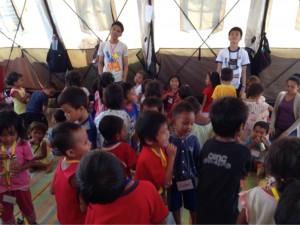
Ekong, not his real name, an 8-year old evacuee from barangay Sta. Catalina can still vividly recall how his parents managed to leave their house. All he could hear were deafening sounds of gunshots, bombs, and scream of their neighbors in that fateful day.
“I just followed my parents. We continued running until we reached a place where we found a public transportation that drove us away from the chaos,” Ekong astoundingly recounted.
That was how Ekong described his experience on the first day of the armed conflict between government troops and the Moro National Liberation Front-Misuari faction.
Two weeks after, Ekong can still recount his fearful experience, but his smiles when asked about the ordeal that he went through is a complete manifestation that he has somehow recovered from the trauma.
When asked what he misses back home, he was quick to say, he misses school.
Social Welfare and Development Secretary Dinky Soliman attributes Ekong’s improved behavior to children’s resiliency.
“Children are resilient. They can readily cope with and bounce back faster than adults to crisis situation such as this. It is also important to follow through their coping mechanism with activities that can help them fully recover,” Secretary Soliman said.
Secretary Soliman cited the setting up of the Special Day Care Center at the Joaquin Enriquez, Sports Complex or Grandstand, the biggest evacuation center in the city, as an important step to help children cope with their trauma.
At the Special Day Care Center, Ekong and other children-evacuees found a temporary place where they can stay, play, and learn. It is where social workers gather children-evacuees to undergo psychosocial intervention through singing, dancing, storytelling, and arts.
“Even in a crisis situation, we at the DSWD continue to implement the Early Childhood Care and Development (ECCD). Since these kids are displaced, they can no longer attend day care center or school in a normal situation, but it is important to continue their learning,” said Greta Martinez, coordinator of DSWD’s Special Day Care Center at the Grandstand.
With her is DSWD Region IX’s Day Care Accreditor Winston Orong, who sees this opportunity as an avenue for children to lessen or to completely heal the trauma brought by the armed conflict. “This is a special place for children where they learn, have fun, and at the same time forget the negative experiences they went through,” said Orong.
The Special Day Care Center caters to children 3 to 12 years old. The class is divided into two groups. First group is composed of children 3-6 years old while children 7-12 years old comprise the second group. Both groups are looked after and taught by volunteer-students and teachers.
Ekong is part of the second group. He feels like he is in a regular school because at the Special Day Care Center, he also writes, reads, draws, and plays with his friends.
Meanwhile, a nursing student from Western Mindanao State University Jayvee Ampo expressed how fulfilling it is for him to be of service to the children. “Ten days are very overwhelming and heartwarming. So happy at least you get to see them smile, sing, dance without fear and worries,” said Ampo.
Neliza Guililan, a pre-school teacher from Bethany School, shared that the Special Day Care Center at the evacuation center provides an opportunity for the children to understand the importance of education. “I commend this effort of the DSWD in putting up care centers for children in the evacuation center because this gives them (children) a continuous relief to the trauma they suffered in the armed conflict,” Guililan further explained.
“Some of them are not attending school back in their community, so through DSWD’s Special Day Care Center, they get to experience how it is to be in school, or how it is to be with other kids learning and listening to a teacher. We do nott only teach them here he basics, but we also teach them the proper hygiene since it is vital for children to observe cleanliness all the time,” said Guililan.
Despite missing his school, Ekong said he is happy with his newfound friends. Young as he is, Ekong fully understands the chaos around him, his family is in a safe place where he and his siblings can walk around, play, and somehow, live normally. ###


